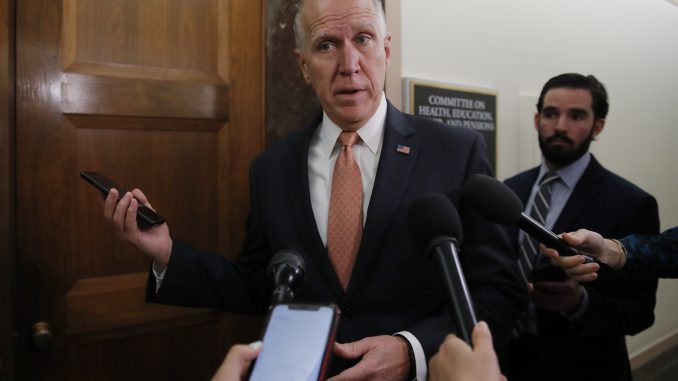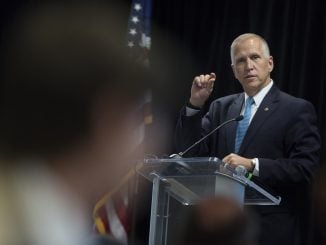
RALEIGH — Primaries are long past, the general election in November is only six months away, and yet, both incumbent North Carolina Sen. Thom Tillis and Democrat challenger Cal Cunningham, a veteran and former state senator, are not giving speeches in front of large crowds or shaking hands at diners. The candidates for one of the nation’s most closely watched races, upon which control of the U.S. Senate may rely, instead are trying to find ways to raise money and earn votes from behind computer screens.
“In addition to being a resource for North Carolinians on COVID-19, our campaign has adapted to this new environment reaching out to voters through virtual events, like our recent weekend of action with RNC Chairwoman Ronna McDaniel, so that we can continue to build the resources and organization that will be necessary to win in November,” Tillis campaign spokesman Andrew Romeo told NSJ.
After the event with McDaniel, Tillis’ campaign released a statement saying, “While the COVID-19 outbreak has changed the way candidates are campaigning, Senator Tillis is not missing a beat, as he continues to reach out to North Carolinians through virtual events.”
Aaron Simpson, a spokesman for Cunningham’s campaign, told NSJ they are also full steam ahead with a virtual campaign. A May 11 press release from the campaign said Cunningham was “barnstorming the state online” to keep his pledge to “go places where Democrats don’t always win or even go.”
“Cal’s campaign has always been about meeting North Carolinians where they are, and that continues to be true during coronavirus,” Simpson told NSJ. “While Cal and the campaign staff are following the governor’s guidelines and working remotely, Cal is able to continue listening to folks across the state through virtual town halls and social media.”
The May 11 press release by Cunningham said the candidate has “shifted his entire campaign online. He has held nearly 30 virtual events, including county by county town halls, roundtables with municipal and community leaders, and discussions with agriculture and rural community leaders.”
Polling, as is usually the case in North Carolina’s U.S. Senate races, has been tight. A WRAL-TV poll taken from April 23-26 found Cunningham leading 41% to Tillis’ 39% with 20% undecided.
 Fundraising had favored Tillis until this point — the incumbent having a long head start in a seat with a six-year term. Tillis has raised $11.7 million and has $6.5 million cash on hand, a strong advantage over Cunningham’s $7.7 million raised and $3 million cash on hand. But in the most recent quarter, Cunningham saw a jump in money raised, more than doubling Tillis’ totals for the same period with $4.4 million for Cunningham to $2.1 million for the sitting senator.
Fundraising had favored Tillis until this point — the incumbent having a long head start in a seat with a six-year term. Tillis has raised $11.7 million and has $6.5 million cash on hand, a strong advantage over Cunningham’s $7.7 million raised and $3 million cash on hand. But in the most recent quarter, Cunningham saw a jump in money raised, more than doubling Tillis’ totals for the same period with $4.4 million for Cunningham to $2.1 million for the sitting senator.
“Cal Cunningham needed to spend heavily to win his primary, leaving our campaign in a strong position entering the second quarter,” said Tillis’ campaign manager Luke Blanchat by press release in reaction to those numbers. “That said, we know full well that we will need to ramp up our fundraising in order to keep pace with (New York Sen.) Chuck Schumer’s liberal donor machine that is coalescing behind our opponent.”
The coronavirus pandemic is not just affecting the race by forcing a change in campaign tactics. The way politicians and their party’s leaders are seen to have handled the response will also have an impact at the polls.
Romeo told NSJ that Tillis, in his capacity as a U.S. senator, has had 35 telephone town halls and 57 media interviews on the pandemic, adding “our campaign has supplemented those efforts through social media and digital initiatives to provide North Carolinians with updates on the virus.”
Cunningham’s campaign contrasts Cooper’s response to the pandemic favorably with that of Trump and elected officials in Washington, like Tillis.
“North Carolinians see a clear difference between the leadership of our governor and what they’re getting out of Washington,” Simpson told NSJ. “While the governor continues to listen to the experts and put the needs of the people first, the administration was slow to respond to this crisis and has failed to clearly articulate their plans. Here at home, folks notice that difference and it just underscores the need to elect new leadership in Washington.”
Romeo says Tillis’ priority at the moment is assisting and informing his constituents, North Carolina residents, regarding the pandemic, and Cunningham’s attacks are false.
“Lifelong political opportunist Cal Cunningham has spent the pandemic either lying about Sen. Tillis’ COVID-19 response in an attempt to score cheap political points or hiding from tough questions in supporter-only town halls closed to the media,” Romeo told NSJ.
November will reveal which of the candidates was better able to get their message out with their more limited campaign tools and who the voters trust to respond to the ongoing crisis.



